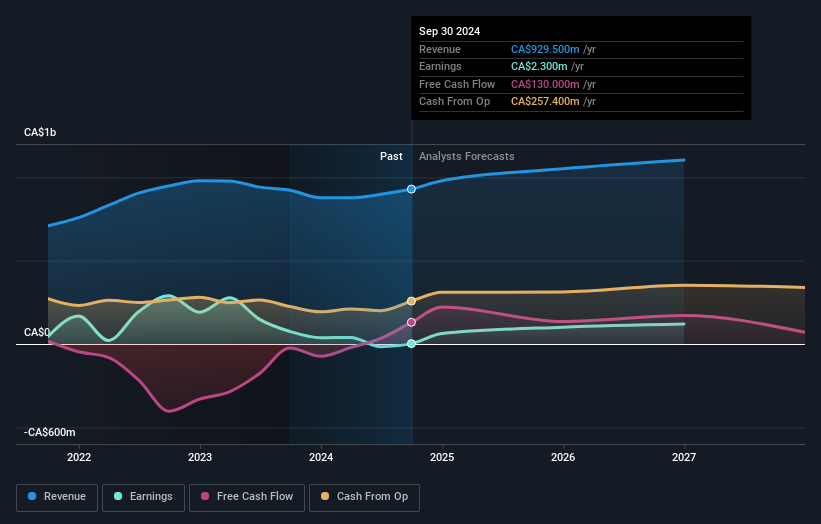While institutions invested in Cargojet Inc. (TSE:CJT) benefited from last week's 12% gain, retail investors stood to gain the most

Key Insights
- Significant control over Cargojet by retail investors implies that the general public has more power to influence management and governance-related decisions
- The top 25 shareholders own 42% of the company
- 43% of Cargojet is held by Institutions
If you want to know who really controls Cargojet Inc. (TSE:CJT), then you'll have to look at the makeup of its share registry. We can see that retail investors own the lion's share in the company with 55% ownership. In other words, the group stands to gain the most (or lose the most) from their investment into the company.
Retail investors gained the most after market cap touched CA$1.9b last week, while institutions who own 43% also benefitted.
Let's take a closer look to see what the different types of shareholders can tell us about Cargojet.
See our latest analysis for Cargojet

What Does The Institutional Ownership Tell Us About Cargojet?
Many institutions measure their performance against an index that approximates the local market. So they usually pay more attention to companies that are included in major indices.
We can see that Cargojet does have institutional investors; and they hold a good portion of the company's stock. This implies the analysts working for those institutions have looked at the stock and they like it. But just like anyone else, they could be wrong. It is not uncommon to see a big share price drop if two large institutional investors try to sell out of a stock at the same time. So it is worth checking the past earnings trajectory of Cargojet, (below). Of course, keep in mind that there are other factors to consider, too.

Hedge funds don't have many shares in Cargojet. The company's largest shareholder is RBC Global Asset Management Inc., with ownership of 12%. With 7.0% and 3.2% of the shares outstanding respectively, CI Global Asset Management and Rbc Indigo Asset Management Inc are the second and third largest shareholders.
Our studies suggest that the top 25 shareholders collectively control less than half of the company's shares, meaning that the company's shares are widely disseminated and there is no dominant shareholder.
While studying institutional ownership for a company can add value to your research, it is also a good practice to research analyst recommendations to get a deeper understand of a stock's expected performance. Quite a few analysts cover the stock, so you could look into forecast growth quite easily.
Insider Ownership Of Cargojet
While the precise definition of an insider can be subjective, almost everyone considers board members to be insiders. Management ultimately answers to the board. However, it is not uncommon for managers to be executive board members, especially if they are a founder or the CEO.
Most consider insider ownership a positive because it can indicate the board is well aligned with other shareholders. However, on some occasions too much power is concentrated within this group.
We can see that insiders own shares in Cargojet Inc.. The insiders have a meaningful stake worth CA$46m. Most would see this as a real positive. If you would like to explore the question of insider alignment, you can click here to see if insiders have been buying or selling.
General Public Ownership
The general public, who are usually individual investors, hold a substantial 55% stake in Cargojet, suggesting it is a fairly popular stock. This level of ownership gives investors from the wider public some power to sway key policy decisions such as board composition, executive compensation, and the dividend payout ratio.
Next Steps:
It's always worth thinking about the different groups who own shares in a company. But to understand Cargojet better, we need to consider many other factors. Like risks, for instance. Every company has them, and we've spotted 3 warning signs for Cargojet (of which 1 can't be ignored!) you should know about.
But ultimately it is the future, not the past, that will determine how well the owners of this business will do. Therefore we think it advisable to take a look at this free report showing whether analysts are predicting a brighter future.
NB: Figures in this article are calculated using data from the last twelve months, which refer to the 12-month period ending on the last date of the month the financial statement is dated. This may not be consistent with full year annual report figures.
New: AI Stock Screener & Alerts
Our new AI Stock Screener scans the market every day to uncover opportunities.
• Dividend Powerhouses (3%+ Yield)
• Undervalued Small Caps with Insider Buying
• High growth Tech and AI Companies
Or build your own from over 50 metrics.
Have feedback on this article? Concerned about the content? Get in touch with us directly. Alternatively, email editorial-team (at) simplywallst.com.
This article by Simply Wall St is general in nature. We provide commentary based on historical data and analyst forecasts only using an unbiased methodology and our articles are not intended to be financial advice. It does not constitute a recommendation to buy or sell any stock, and does not take account of your objectives, or your financial situation. We aim to bring you long-term focused analysis driven by fundamental data. Note that our analysis may not factor in the latest price-sensitive company announcements or qualitative material. Simply Wall St has no position in any stocks mentioned.
About TSX:CJT
Cargojet
Provides time sensitive overnight air cargo services and carriers in Canada.
Reasonable growth potential second-rate dividend payer.

